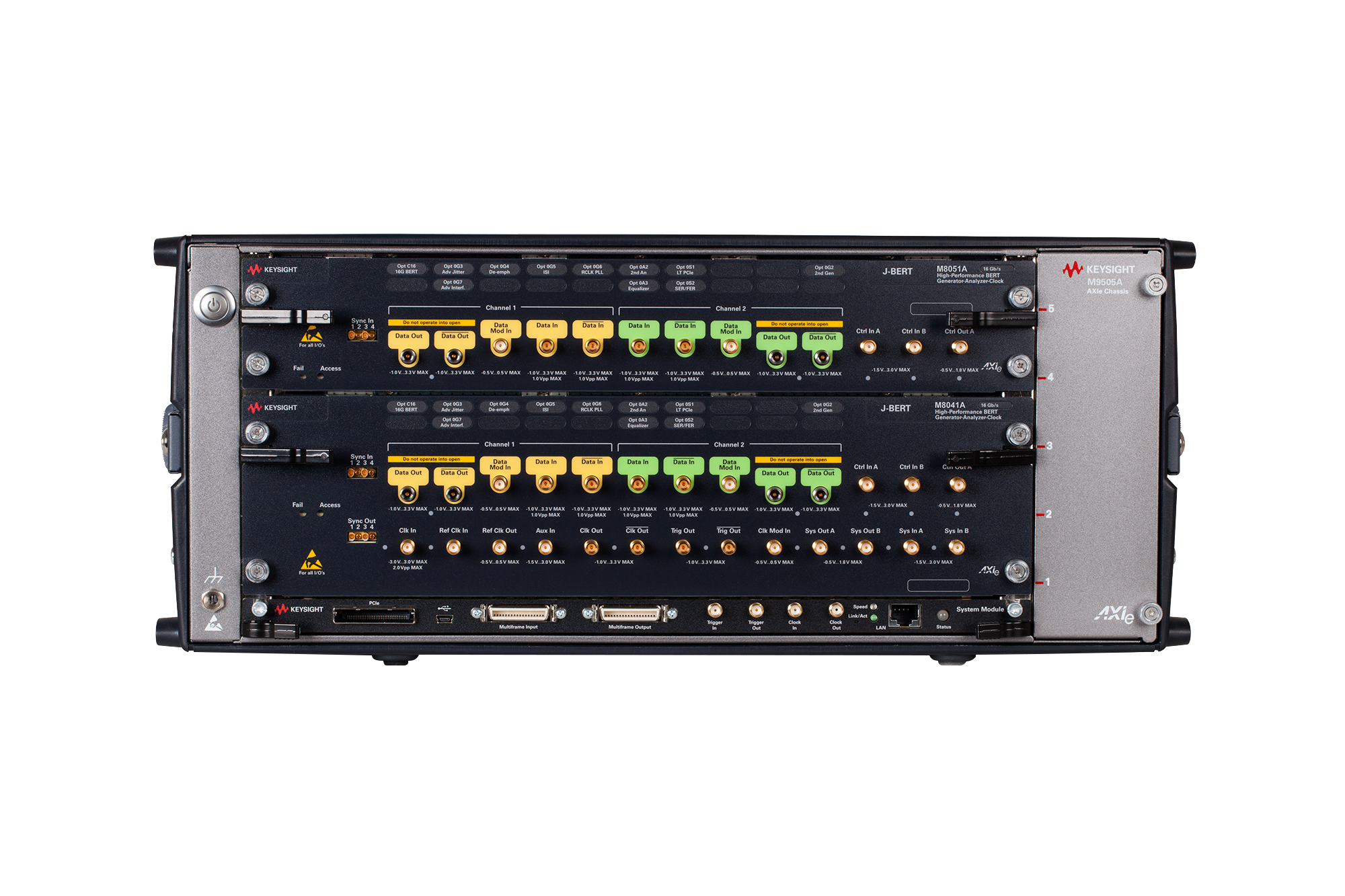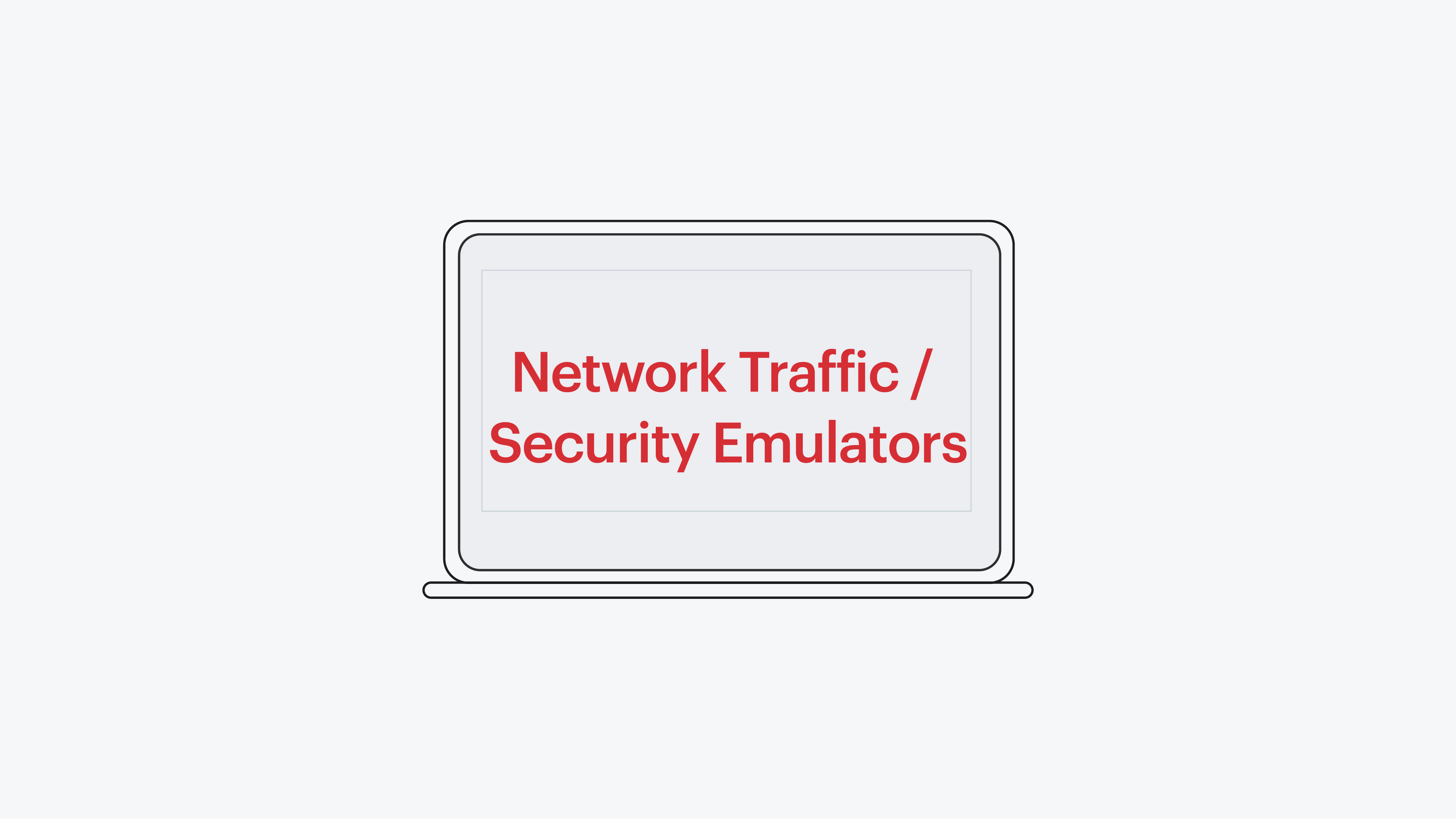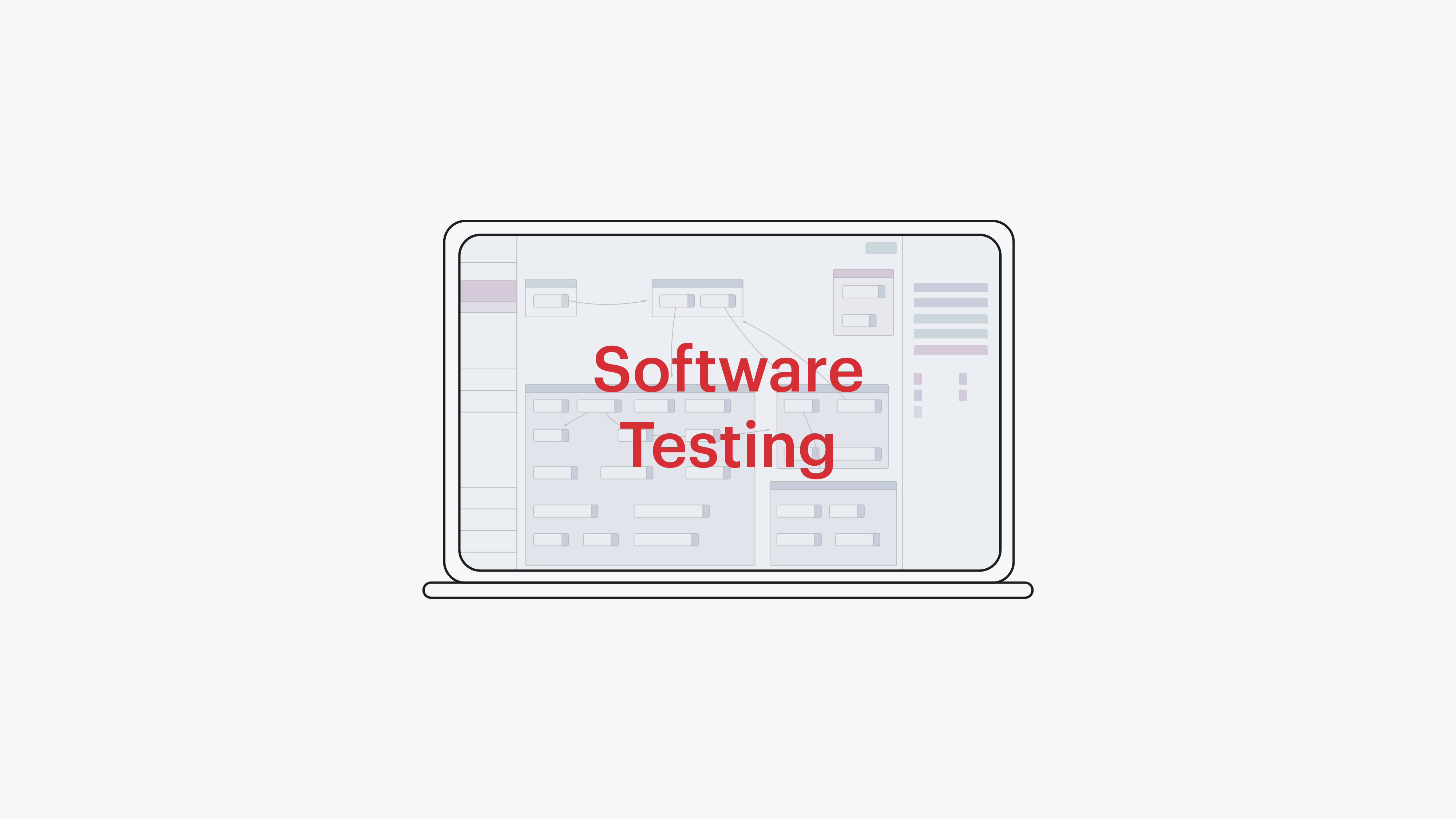How to Validate an Optical Transceiver in an MRI System


Ensuring optimal optical transceiver performance in an MRI system with an oscilloscope and J-BERT
Validating optical transceiver performance in magnetic resonance imaging (MRI) systems requires testing the components to ensure effective functionality in high magnetic strength environments. With MRI systems adopting higher magnetic fields, system designers have started replacing heavily shielded copper cables with fiber optics to transfer data from the MRI system to the control room. For receiver sensitivity testing, MRI engineers measure the bit error rate (BER) at different power levels to determine the minimum power required for acceptable performance. They also introduce signal degradation factors such as poor extinction ratios, jitter, and inter-symbol interference (ISI). The transceiver must maintain acceptable performance levels despite these stresses.
Transmitter eye-mask testing is important to evaluate transmitted signal quality against a predefined mask. The transceiver performance test requires a sampling oscilloscope and a jitter bit error ratio tester (BERT). The oscilloscope can capture and analyze optical waveforms, generate eye diagrams to visually inspect signal integrity and identify jitter and noise that affect receiver sensitivity. In addition, it can perform eye-mask tests to verify the transmitted signal. A jitter BERT is used to measure the quality of a digital signal transmission. The tester calculates the number of errors in the received data to ensure that the fiber optic cables used in MRI systems can handle the high data rates required without introducing significant errors.

Optical transceiver test solution
Explore products in our optical transceiver test solution
-
![N1092A 28/45 GHz Single Optical Channel DCA-M with Option CDR]()
N1092A 28/45 GHz Single Optical Channel DCA-M with Option CDR
-
![M8020A J-BERT High-Performance BERTs]()
M8020A J-BERT High-Performance BERTs


How to Validate Optical Transceiver in MRI System
N1092A 28/45 GHz Single Optical Channel DCA-M with Option CDR
N1092A 28/45 GHz Single Optical Channel DCA-M with Option CDR
Specs
| Bandwidth | Up to 45 GHz optical |
| Max memory depth | N/A |
| Max sample rate | Up to 250 KHz |
| Type |
|


How to Validate Optical Transceiver in MRI System
M8020A J-BERT High-Performance BERTs
The high-performance Keysight J-BERT M8020A enables fast, accurate receiver characterization of single- and multi-lane devices running up to 16 or 32 Gb/s.
Specs
| Product Categories | Data Generators |
| Standards |
|
| Module Type |
|
| Amplitude | 0.9 Vpp @ 32 Gb/s |
| Clock data recovery built-in | Yes w/ adj loop bandwidth (20 MHz max) |
| Equalizer |
|
| FEC |
|
| Jitter Type |
|
| Line Coding |
|
| Link Training |
|
| Number of channels |
|
| Type |
|
| Supported Data Rates | 32 Gbaud |
| Max sample rate | 32.4 Gb/s |
Discover resources and insights
Additional resources for verifying optical transmitter and receiver compliance in MRI systems
-
Application note
Explore the Critical Test Considerations for Medical Imaging Systems
-
Application note
Learn the Techniques for Higher Accuracy Optical Measurements
-
Brochure
Explore the Keysight Digital Communication Analyzer (DCA) Solutions
Related use cases
-
![How to Scale Application Performance Monitoring]() segmentation:business-unit/EISG,segmentation:campaign/Software_Test,segmentation:product-category/Test_Automation_Software,keysight:product-lines/eg,keysight:dtx/solutions/facets/development-area/software,keysight:dtx/solutions/facets/workflow-stage/qa,keysight:dtx/solutions/facets/design-and-test-product/software-test,segmentation:software-type/Test_Automation,keysight:dtx/solutions/facets/industry/enterprise-it,keysight:dtx/solutions/facets/industry/aerospace-and-defense,keysight:dtx/solutions/facets/industry/healthcare,segmentation:funnel/bofu,segmentation:product-category/Test_Automation_Software/Software_Application_Testingsegmentation:business-unit/EISG,segmentation:campaign/Software_Test,segmentation:product-category/Test_Automation_Software,keysight:product-lines/eg,keysight:dtx/solutions/facets/development-area/software,keysight:dtx/solutions/facets/workflow-stage/qa,keysight:dtx/solutions/facets/design-and-test-product/software-test,segmentation:software-type/Test_Automation,keysight:dtx/solutions/facets/industry/enterprise-it,keysight:dtx/solutions/facets/industry/aerospace-and-defense,keysight:dtx/solutions/facets/industry/healthcare,segmentation:funnel/bofu,segmentation:product-category/Test_Automation_Software/Software_Application_Testingsegmentation:business-unit/EISG,segmentation:campaign/Software_Test,segmentation:product-category/Test_Automation_Software,keysight:product-lines/eg,keysight:dtx/solutions/facets/development-area/software,keysight:dtx/solutions/facets/workflow-stage/qa,keysight:dtx/solutions/facets/design-and-test-product/software-test,segmentation:software-type/Test_Automation,keysight:dtx/solutions/facets/industry/enterprise-it,keysight:dtx/solutions/facets/industry/aerospace-and-defense,keysight:dtx/solutions/facets/industry/healthcare,segmentation:funnel/bofu,segmentation:product-category/Test_Automation_Software/Software_Application_Testingsegmentation:business-unit/EISG,segmentation:campaign/Software_Test,segmentation:product-category/Test_Automation_Software,keysight:product-lines/eg,keysight:dtx/solutions/facets/development-area/software,keysight:dtx/solutions/facets/workflow-stage/qa,keysight:dtx/solutions/facets/design-and-test-product/software-test,segmentation:software-type/Test_Automation,keysight:dtx/solutions/facets/industry/enterprise-it,keysight:dtx/solutions/facets/industry/aerospace-and-defense,keysight:dtx/solutions/facets/industry/healthcare,segmentation:funnel/bofu,segmentation:product-category/Test_Automation_Software/Software_Application_Testingsegmentation:business-unit/EISG,segmentation:campaign/Software_Test,segmentation:product-category/Test_Automation_Software,keysight:product-lines/eg,keysight:dtx/solutions/facets/development-area/software,keysight:dtx/solutions/facets/workflow-stage/qa,keysight:dtx/solutions/facets/design-and-test-product/software-test,segmentation:software-type/Test_Automation,keysight:dtx/solutions/facets/industry/enterprise-it,keysight:dtx/solutions/facets/industry/aerospace-and-defense,keysight:dtx/solutions/facets/industry/healthcare,segmentation:funnel/bofu,segmentation:product-category/Test_Automation_Software/Software_Application_Testingsegmentation:business-unit/EISG,segmentation:campaign/Software_Test,segmentation:product-category/Test_Automation_Software,keysight:product-lines/eg,keysight:dtx/solutions/facets/development-area/software,keysight:dtx/solutions/facets/workflow-stage/qa,keysight:dtx/solutions/facets/design-and-test-product/software-test,segmentation:software-type/Test_Automation,keysight:dtx/solutions/facets/industry/enterprise-it,keysight:dtx/solutions/facets/industry/aerospace-and-defense,keysight:dtx/solutions/facets/industry/healthcare,segmentation:funnel/bofu,segmentation:product-category/Test_Automation_Software/Software_Application_Testingsegmentation:business-unit/EISG,segmentation:campaign/Software_Test,segmentation:product-category/Test_Automation_Software,keysight:product-lines/eg,keysight:dtx/solutions/facets/development-area/software,keysight:dtx/solutions/facets/workflow-stage/qa,keysight:dtx/solutions/facets/design-and-test-product/software-test,segmentation:software-type/Test_Automation,keysight:dtx/solutions/facets/industry/enterprise-it,keysight:dtx/solutions/facets/industry/aerospace-and-defense,keysight:dtx/solutions/facets/industry/healthcare,segmentation:funnel/bofu,segmentation:product-category/Test_Automation_Software/Software_Application_Testingsegmentation:business-unit/EISG,segmentation:campaign/Software_Test,segmentation:product-category/Test_Automation_Software,keysight:product-lines/eg,keysight:dtx/solutions/facets/development-area/software,keysight:dtx/solutions/facets/workflow-stage/qa,keysight:dtx/solutions/facets/design-and-test-product/software-test,segmentation:software-type/Test_Automation,keysight:dtx/solutions/facets/industry/enterprise-it,keysight:dtx/solutions/facets/industry/aerospace-and-defense,keysight:dtx/solutions/facets/industry/healthcare,segmentation:funnel/bofu,segmentation:product-category/Test_Automation_Software/Software_Application_Testingsegmentation:business-unit/EISG,segmentation:campaign/Software_Test,segmentation:product-category/Test_Automation_Software,keysight:product-lines/eg,keysight:dtx/solutions/facets/development-area/software,keysight:dtx/solutions/facets/workflow-stage/qa,keysight:dtx/solutions/facets/design-and-test-product/software-test,segmentation:software-type/Test_Automation,keysight:dtx/solutions/facets/industry/enterprise-it,keysight:dtx/solutions/facets/industry/aerospace-and-defense,keysight:dtx/solutions/facets/industry/healthcare,segmentation:funnel/bofu,segmentation:product-category/Test_Automation_Software/Software_Application_Testingsegmentation:business-unit/EISG,segmentation:campaign/Software_Test,segmentation:product-category/Test_Automation_Software,keysight:product-lines/eg,keysight:dtx/solutions/facets/development-area/software,keysight:dtx/solutions/facets/workflow-stage/qa,keysight:dtx/solutions/facets/design-and-test-product/software-test,segmentation:software-type/Test_Automation,keysight:dtx/solutions/facets/industry/enterprise-it,keysight:dtx/solutions/facets/industry/aerospace-and-defense,keysight:dtx/solutions/facets/industry/healthcare,segmentation:funnel/bofu,segmentation:product-category/Test_Automation_Software/Software_Application_Testingsegmentation:business-unit/EISG,segmentation:campaign/Software_Test,segmentation:product-category/Test_Automation_Software,keysight:product-lines/eg,keysight:dtx/solutions/facets/development-area/software,keysight:dtx/solutions/facets/workflow-stage/qa,keysight:dtx/solutions/facets/design-and-test-product/software-test,segmentation:software-type/Test_Automation,keysight:dtx/solutions/facets/industry/enterprise-it,keysight:dtx/solutions/facets/industry/aerospace-and-defense,keysight:dtx/solutions/facets/industry/healthcare,segmentation:funnel/bofu,segmentation:product-category/Test_Automation_Software/Software_Application_Testingsegmentation:business-unit/EISG,segmentation:campaign/Software_Test,segmentation:product-category/Test_Automation_Software,keysight:product-lines/eg,keysight:dtx/solutions/facets/development-area/software,keysight:dtx/solutions/facets/workflow-stage/qa,keysight:dtx/solutions/facets/design-and-test-product/software-test,segmentation:software-type/Test_Automation,keysight:dtx/solutions/facets/industry/enterprise-it,keysight:dtx/solutions/facets/industry/aerospace-and-defense,keysight:dtx/solutions/facets/industry/healthcare,segmentation:funnel/bofu,segmentation:product-category/Test_Automation_Software/Software_Application_Testingsegmentation:business-unit/EISG,segmentation:campaign/Software_Test,segmentation:product-category/Test_Automation_Software,keysight:product-lines/eg,keysight:dtx/solutions/facets/development-area/software,keysight:dtx/solutions/facets/workflow-stage/qa,keysight:dtx/solutions/facets/design-and-test-product/software-test,segmentation:software-type/Test_Automation,keysight:dtx/solutions/facets/industry/enterprise-it,keysight:dtx/solutions/facets/industry/aerospace-and-defense,keysight:dtx/solutions/facets/industry/healthcare,segmentation:funnel/bofu,segmentation:product-category/Test_Automation_Software/Software_Application_Testing
segmentation:business-unit/EISG,segmentation:campaign/Software_Test,segmentation:product-category/Test_Automation_Software,keysight:product-lines/eg,keysight:dtx/solutions/facets/development-area/software,keysight:dtx/solutions/facets/workflow-stage/qa,keysight:dtx/solutions/facets/design-and-test-product/software-test,segmentation:software-type/Test_Automation,keysight:dtx/solutions/facets/industry/enterprise-it,keysight:dtx/solutions/facets/industry/aerospace-and-defense,keysight:dtx/solutions/facets/industry/healthcare,segmentation:funnel/bofu,segmentation:product-category/Test_Automation_Software/Software_Application_Testingsegmentation:business-unit/EISG,segmentation:campaign/Software_Test,segmentation:product-category/Test_Automation_Software,keysight:product-lines/eg,keysight:dtx/solutions/facets/development-area/software,keysight:dtx/solutions/facets/workflow-stage/qa,keysight:dtx/solutions/facets/design-and-test-product/software-test,segmentation:software-type/Test_Automation,keysight:dtx/solutions/facets/industry/enterprise-it,keysight:dtx/solutions/facets/industry/aerospace-and-defense,keysight:dtx/solutions/facets/industry/healthcare,segmentation:funnel/bofu,segmentation:product-category/Test_Automation_Software/Software_Application_Testingsegmentation:business-unit/EISG,segmentation:campaign/Software_Test,segmentation:product-category/Test_Automation_Software,keysight:product-lines/eg,keysight:dtx/solutions/facets/development-area/software,keysight:dtx/solutions/facets/workflow-stage/qa,keysight:dtx/solutions/facets/design-and-test-product/software-test,segmentation:software-type/Test_Automation,keysight:dtx/solutions/facets/industry/enterprise-it,keysight:dtx/solutions/facets/industry/aerospace-and-defense,keysight:dtx/solutions/facets/industry/healthcare,segmentation:funnel/bofu,segmentation:product-category/Test_Automation_Software/Software_Application_Testingsegmentation:business-unit/EISG,segmentation:campaign/Software_Test,segmentation:product-category/Test_Automation_Software,keysight:product-lines/eg,keysight:dtx/solutions/facets/development-area/software,keysight:dtx/solutions/facets/workflow-stage/qa,keysight:dtx/solutions/facets/design-and-test-product/software-test,segmentation:software-type/Test_Automation,keysight:dtx/solutions/facets/industry/enterprise-it,keysight:dtx/solutions/facets/industry/aerospace-and-defense,keysight:dtx/solutions/facets/industry/healthcare,segmentation:funnel/bofu,segmentation:product-category/Test_Automation_Software/Software_Application_Testingsegmentation:business-unit/EISG,segmentation:campaign/Software_Test,segmentation:product-category/Test_Automation_Software,keysight:product-lines/eg,keysight:dtx/solutions/facets/development-area/software,keysight:dtx/solutions/facets/workflow-stage/qa,keysight:dtx/solutions/facets/design-and-test-product/software-test,segmentation:software-type/Test_Automation,keysight:dtx/solutions/facets/industry/enterprise-it,keysight:dtx/solutions/facets/industry/aerospace-and-defense,keysight:dtx/solutions/facets/industry/healthcare,segmentation:funnel/bofu,segmentation:product-category/Test_Automation_Software/Software_Application_Testingsegmentation:business-unit/EISG,segmentation:campaign/Software_Test,segmentation:product-category/Test_Automation_Software,keysight:product-lines/eg,keysight:dtx/solutions/facets/development-area/software,keysight:dtx/solutions/facets/workflow-stage/qa,keysight:dtx/solutions/facets/design-and-test-product/software-test,segmentation:software-type/Test_Automation,keysight:dtx/solutions/facets/industry/enterprise-it,keysight:dtx/solutions/facets/industry/aerospace-and-defense,keysight:dtx/solutions/facets/industry/healthcare,segmentation:funnel/bofu,segmentation:product-category/Test_Automation_Software/Software_Application_Testingsegmentation:business-unit/EISG,segmentation:campaign/Software_Test,segmentation:product-category/Test_Automation_Software,keysight:product-lines/eg,keysight:dtx/solutions/facets/development-area/software,keysight:dtx/solutions/facets/workflow-stage/qa,keysight:dtx/solutions/facets/design-and-test-product/software-test,segmentation:software-type/Test_Automation,keysight:dtx/solutions/facets/industry/enterprise-it,keysight:dtx/solutions/facets/industry/aerospace-and-defense,keysight:dtx/solutions/facets/industry/healthcare,segmentation:funnel/bofu,segmentation:product-category/Test_Automation_Software/Software_Application_Testingsegmentation:business-unit/EISG,segmentation:campaign/Software_Test,segmentation:product-category/Test_Automation_Software,keysight:product-lines/eg,keysight:dtx/solutions/facets/development-area/software,keysight:dtx/solutions/facets/workflow-stage/qa,keysight:dtx/solutions/facets/design-and-test-product/software-test,segmentation:software-type/Test_Automation,keysight:dtx/solutions/facets/industry/enterprise-it,keysight:dtx/solutions/facets/industry/aerospace-and-defense,keysight:dtx/solutions/facets/industry/healthcare,segmentation:funnel/bofu,segmentation:product-category/Test_Automation_Software/Software_Application_Testingsegmentation:business-unit/EISG,segmentation:campaign/Software_Test,segmentation:product-category/Test_Automation_Software,keysight:product-lines/eg,keysight:dtx/solutions/facets/development-area/software,keysight:dtx/solutions/facets/workflow-stage/qa,keysight:dtx/solutions/facets/design-and-test-product/software-test,segmentation:software-type/Test_Automation,keysight:dtx/solutions/facets/industry/enterprise-it,keysight:dtx/solutions/facets/industry/aerospace-and-defense,keysight:dtx/solutions/facets/industry/healthcare,segmentation:funnel/bofu,segmentation:product-category/Test_Automation_Software/Software_Application_Testingsegmentation:business-unit/EISG,segmentation:campaign/Software_Test,segmentation:product-category/Test_Automation_Software,keysight:product-lines/eg,keysight:dtx/solutions/facets/development-area/software,keysight:dtx/solutions/facets/workflow-stage/qa,keysight:dtx/solutions/facets/design-and-test-product/software-test,segmentation:software-type/Test_Automation,keysight:dtx/solutions/facets/industry/enterprise-it,keysight:dtx/solutions/facets/industry/aerospace-and-defense,keysight:dtx/solutions/facets/industry/healthcare,segmentation:funnel/bofu,segmentation:product-category/Test_Automation_Software/Software_Application_Testingsegmentation:business-unit/EISG,segmentation:campaign/Software_Test,segmentation:product-category/Test_Automation_Software,keysight:product-lines/eg,keysight:dtx/solutions/facets/development-area/software,keysight:dtx/solutions/facets/workflow-stage/qa,keysight:dtx/solutions/facets/design-and-test-product/software-test,segmentation:software-type/Test_Automation,keysight:dtx/solutions/facets/industry/enterprise-it,keysight:dtx/solutions/facets/industry/aerospace-and-defense,keysight:dtx/solutions/facets/industry/healthcare,segmentation:funnel/bofu,segmentation:product-category/Test_Automation_Software/Software_Application_Testingsegmentation:business-unit/EISG,segmentation:campaign/Software_Test,segmentation:product-category/Test_Automation_Software,keysight:product-lines/eg,keysight:dtx/solutions/facets/development-area/software,keysight:dtx/solutions/facets/workflow-stage/qa,keysight:dtx/solutions/facets/design-and-test-product/software-test,segmentation:software-type/Test_Automation,keysight:dtx/solutions/facets/industry/enterprise-it,keysight:dtx/solutions/facets/industry/aerospace-and-defense,keysight:dtx/solutions/facets/industry/healthcare,segmentation:funnel/bofu,segmentation:product-category/Test_Automation_Software/Software_Application_Testingsegmentation:business-unit/EISG,segmentation:campaign/Software_Test,segmentation:product-category/Test_Automation_Software,keysight:product-lines/eg,keysight:dtx/solutions/facets/development-area/software,keysight:dtx/solutions/facets/workflow-stage/qa,keysight:dtx/solutions/facets/design-and-test-product/software-test,segmentation:software-type/Test_Automation,keysight:dtx/solutions/facets/industry/enterprise-it,keysight:dtx/solutions/facets/industry/aerospace-and-defense,keysight:dtx/solutions/facets/industry/healthcare,segmentation:funnel/bofu,segmentation:product-category/Test_Automation_Software/Software_Application_TestingHow to Scale Application Performance Monitoring
Optimizing customer experience and conversions requires dynamic website and application performance monitoring. Learn how to deliver with application performance monitoring software.
Learn more

-
![How to Conform with Security Regulations for IoT Devices]() keysight:product-lines/ns,segmentation:business-unit/CSG,segmentation:funnel/bofu,segmentation:software-type/Network_Security_Traffic_Emulators,segmentation:campaign/Network_Security,keysight:dtx/solutions/facets/workflow-stage/conformance-and-compliance,keysight:dtx/solutions/facets/industry/wireless-communications,keysight:dtx/solutions/facets/industry/healthcare,keysight:dtx/solutions/facets/development-area/networks,segmentation:product-category/Network_Security_Traffic_Emulators/Security_Attack_Simulators,segmentation:product-category/Network_Security_Traffic_Emulators,keysight:dtx/solutions/facets/design-and-test-product/network-emulatorkeysight:product-lines/ns,segmentation:business-unit/CSG,segmentation:funnel/bofu,segmentation:software-type/Network_Security_Traffic_Emulators,segmentation:campaign/Network_Security,keysight:dtx/solutions/facets/workflow-stage/conformance-and-compliance,keysight:dtx/solutions/facets/industry/wireless-communications,keysight:dtx/solutions/facets/industry/healthcare,keysight:dtx/solutions/facets/development-area/networks,segmentation:product-category/Network_Security_Traffic_Emulators/Security_Attack_Simulators,segmentation:product-category/Network_Security_Traffic_Emulators,keysight:dtx/solutions/facets/design-and-test-product/network-emulatorkeysight:product-lines/ns,segmentation:business-unit/CSG,segmentation:funnel/bofu,segmentation:software-type/Network_Security_Traffic_Emulators,segmentation:campaign/Network_Security,keysight:dtx/solutions/facets/workflow-stage/conformance-and-compliance,keysight:dtx/solutions/facets/industry/wireless-communications,keysight:dtx/solutions/facets/industry/healthcare,keysight:dtx/solutions/facets/development-area/networks,segmentation:product-category/Network_Security_Traffic_Emulators/Security_Attack_Simulators,segmentation:product-category/Network_Security_Traffic_Emulators,keysight:dtx/solutions/facets/design-and-test-product/network-emulatorkeysight:product-lines/ns,segmentation:business-unit/CSG,segmentation:funnel/bofu,segmentation:software-type/Network_Security_Traffic_Emulators,segmentation:campaign/Network_Security,keysight:dtx/solutions/facets/workflow-stage/conformance-and-compliance,keysight:dtx/solutions/facets/industry/wireless-communications,keysight:dtx/solutions/facets/industry/healthcare,keysight:dtx/solutions/facets/development-area/networks,segmentation:product-category/Network_Security_Traffic_Emulators/Security_Attack_Simulators,segmentation:product-category/Network_Security_Traffic_Emulators,keysight:dtx/solutions/facets/design-and-test-product/network-emulatorkeysight:product-lines/ns,segmentation:business-unit/CSG,segmentation:funnel/bofu,segmentation:software-type/Network_Security_Traffic_Emulators,segmentation:campaign/Network_Security,keysight:dtx/solutions/facets/workflow-stage/conformance-and-compliance,keysight:dtx/solutions/facets/industry/wireless-communications,keysight:dtx/solutions/facets/industry/healthcare,keysight:dtx/solutions/facets/development-area/networks,segmentation:product-category/Network_Security_Traffic_Emulators/Security_Attack_Simulators,segmentation:product-category/Network_Security_Traffic_Emulators,keysight:dtx/solutions/facets/design-and-test-product/network-emulatorkeysight:product-lines/ns,segmentation:business-unit/CSG,segmentation:funnel/bofu,segmentation:software-type/Network_Security_Traffic_Emulators,segmentation:campaign/Network_Security,keysight:dtx/solutions/facets/workflow-stage/conformance-and-compliance,keysight:dtx/solutions/facets/industry/wireless-communications,keysight:dtx/solutions/facets/industry/healthcare,keysight:dtx/solutions/facets/development-area/networks,segmentation:product-category/Network_Security_Traffic_Emulators/Security_Attack_Simulators,segmentation:product-category/Network_Security_Traffic_Emulators,keysight:dtx/solutions/facets/design-and-test-product/network-emulatorkeysight:product-lines/ns,segmentation:business-unit/CSG,segmentation:funnel/bofu,segmentation:software-type/Network_Security_Traffic_Emulators,segmentation:campaign/Network_Security,keysight:dtx/solutions/facets/workflow-stage/conformance-and-compliance,keysight:dtx/solutions/facets/industry/wireless-communications,keysight:dtx/solutions/facets/industry/healthcare,keysight:dtx/solutions/facets/development-area/networks,segmentation:product-category/Network_Security_Traffic_Emulators/Security_Attack_Simulators,segmentation:product-category/Network_Security_Traffic_Emulators,keysight:dtx/solutions/facets/design-and-test-product/network-emulatorkeysight:product-lines/ns,segmentation:business-unit/CSG,segmentation:funnel/bofu,segmentation:software-type/Network_Security_Traffic_Emulators,segmentation:campaign/Network_Security,keysight:dtx/solutions/facets/workflow-stage/conformance-and-compliance,keysight:dtx/solutions/facets/industry/wireless-communications,keysight:dtx/solutions/facets/industry/healthcare,keysight:dtx/solutions/facets/development-area/networks,segmentation:product-category/Network_Security_Traffic_Emulators/Security_Attack_Simulators,segmentation:product-category/Network_Security_Traffic_Emulators,keysight:dtx/solutions/facets/design-and-test-product/network-emulatorkeysight:product-lines/ns,segmentation:business-unit/CSG,segmentation:funnel/bofu,segmentation:software-type/Network_Security_Traffic_Emulators,segmentation:campaign/Network_Security,keysight:dtx/solutions/facets/workflow-stage/conformance-and-compliance,keysight:dtx/solutions/facets/industry/wireless-communications,keysight:dtx/solutions/facets/industry/healthcare,keysight:dtx/solutions/facets/development-area/networks,segmentation:product-category/Network_Security_Traffic_Emulators/Security_Attack_Simulators,segmentation:product-category/Network_Security_Traffic_Emulators,keysight:dtx/solutions/facets/design-and-test-product/network-emulatorkeysight:product-lines/ns,segmentation:business-unit/CSG,segmentation:funnel/bofu,segmentation:software-type/Network_Security_Traffic_Emulators,segmentation:campaign/Network_Security,keysight:dtx/solutions/facets/workflow-stage/conformance-and-compliance,keysight:dtx/solutions/facets/industry/wireless-communications,keysight:dtx/solutions/facets/industry/healthcare,keysight:dtx/solutions/facets/development-area/networks,segmentation:product-category/Network_Security_Traffic_Emulators/Security_Attack_Simulators,segmentation:product-category/Network_Security_Traffic_Emulators,keysight:dtx/solutions/facets/design-and-test-product/network-emulatorkeysight:product-lines/ns,segmentation:business-unit/CSG,segmentation:funnel/bofu,segmentation:software-type/Network_Security_Traffic_Emulators,segmentation:campaign/Network_Security,keysight:dtx/solutions/facets/workflow-stage/conformance-and-compliance,keysight:dtx/solutions/facets/industry/wireless-communications,keysight:dtx/solutions/facets/industry/healthcare,keysight:dtx/solutions/facets/development-area/networks,segmentation:product-category/Network_Security_Traffic_Emulators/Security_Attack_Simulators,segmentation:product-category/Network_Security_Traffic_Emulators,keysight:dtx/solutions/facets/design-and-test-product/network-emulatorkeysight:product-lines/ns,segmentation:business-unit/CSG,segmentation:funnel/bofu,segmentation:software-type/Network_Security_Traffic_Emulators,segmentation:campaign/Network_Security,keysight:dtx/solutions/facets/workflow-stage/conformance-and-compliance,keysight:dtx/solutions/facets/industry/wireless-communications,keysight:dtx/solutions/facets/industry/healthcare,keysight:dtx/solutions/facets/development-area/networks,segmentation:product-category/Network_Security_Traffic_Emulators/Security_Attack_Simulators,segmentation:product-category/Network_Security_Traffic_Emulators,keysight:dtx/solutions/facets/design-and-test-product/network-emulator
keysight:product-lines/ns,segmentation:business-unit/CSG,segmentation:funnel/bofu,segmentation:software-type/Network_Security_Traffic_Emulators,segmentation:campaign/Network_Security,keysight:dtx/solutions/facets/workflow-stage/conformance-and-compliance,keysight:dtx/solutions/facets/industry/wireless-communications,keysight:dtx/solutions/facets/industry/healthcare,keysight:dtx/solutions/facets/development-area/networks,segmentation:product-category/Network_Security_Traffic_Emulators/Security_Attack_Simulators,segmentation:product-category/Network_Security_Traffic_Emulators,keysight:dtx/solutions/facets/design-and-test-product/network-emulatorkeysight:product-lines/ns,segmentation:business-unit/CSG,segmentation:funnel/bofu,segmentation:software-type/Network_Security_Traffic_Emulators,segmentation:campaign/Network_Security,keysight:dtx/solutions/facets/workflow-stage/conformance-and-compliance,keysight:dtx/solutions/facets/industry/wireless-communications,keysight:dtx/solutions/facets/industry/healthcare,keysight:dtx/solutions/facets/development-area/networks,segmentation:product-category/Network_Security_Traffic_Emulators/Security_Attack_Simulators,segmentation:product-category/Network_Security_Traffic_Emulators,keysight:dtx/solutions/facets/design-and-test-product/network-emulatorkeysight:product-lines/ns,segmentation:business-unit/CSG,segmentation:funnel/bofu,segmentation:software-type/Network_Security_Traffic_Emulators,segmentation:campaign/Network_Security,keysight:dtx/solutions/facets/workflow-stage/conformance-and-compliance,keysight:dtx/solutions/facets/industry/wireless-communications,keysight:dtx/solutions/facets/industry/healthcare,keysight:dtx/solutions/facets/development-area/networks,segmentation:product-category/Network_Security_Traffic_Emulators/Security_Attack_Simulators,segmentation:product-category/Network_Security_Traffic_Emulators,keysight:dtx/solutions/facets/design-and-test-product/network-emulatorkeysight:product-lines/ns,segmentation:business-unit/CSG,segmentation:funnel/bofu,segmentation:software-type/Network_Security_Traffic_Emulators,segmentation:campaign/Network_Security,keysight:dtx/solutions/facets/workflow-stage/conformance-and-compliance,keysight:dtx/solutions/facets/industry/wireless-communications,keysight:dtx/solutions/facets/industry/healthcare,keysight:dtx/solutions/facets/development-area/networks,segmentation:product-category/Network_Security_Traffic_Emulators/Security_Attack_Simulators,segmentation:product-category/Network_Security_Traffic_Emulators,keysight:dtx/solutions/facets/design-and-test-product/network-emulatorkeysight:product-lines/ns,segmentation:business-unit/CSG,segmentation:funnel/bofu,segmentation:software-type/Network_Security_Traffic_Emulators,segmentation:campaign/Network_Security,keysight:dtx/solutions/facets/workflow-stage/conformance-and-compliance,keysight:dtx/solutions/facets/industry/wireless-communications,keysight:dtx/solutions/facets/industry/healthcare,keysight:dtx/solutions/facets/development-area/networks,segmentation:product-category/Network_Security_Traffic_Emulators/Security_Attack_Simulators,segmentation:product-category/Network_Security_Traffic_Emulators,keysight:dtx/solutions/facets/design-and-test-product/network-emulatorkeysight:product-lines/ns,segmentation:business-unit/CSG,segmentation:funnel/bofu,segmentation:software-type/Network_Security_Traffic_Emulators,segmentation:campaign/Network_Security,keysight:dtx/solutions/facets/workflow-stage/conformance-and-compliance,keysight:dtx/solutions/facets/industry/wireless-communications,keysight:dtx/solutions/facets/industry/healthcare,keysight:dtx/solutions/facets/development-area/networks,segmentation:product-category/Network_Security_Traffic_Emulators/Security_Attack_Simulators,segmentation:product-category/Network_Security_Traffic_Emulators,keysight:dtx/solutions/facets/design-and-test-product/network-emulatorkeysight:product-lines/ns,segmentation:business-unit/CSG,segmentation:funnel/bofu,segmentation:software-type/Network_Security_Traffic_Emulators,segmentation:campaign/Network_Security,keysight:dtx/solutions/facets/workflow-stage/conformance-and-compliance,keysight:dtx/solutions/facets/industry/wireless-communications,keysight:dtx/solutions/facets/industry/healthcare,keysight:dtx/solutions/facets/development-area/networks,segmentation:product-category/Network_Security_Traffic_Emulators/Security_Attack_Simulators,segmentation:product-category/Network_Security_Traffic_Emulators,keysight:dtx/solutions/facets/design-and-test-product/network-emulatorkeysight:product-lines/ns,segmentation:business-unit/CSG,segmentation:funnel/bofu,segmentation:software-type/Network_Security_Traffic_Emulators,segmentation:campaign/Network_Security,keysight:dtx/solutions/facets/workflow-stage/conformance-and-compliance,keysight:dtx/solutions/facets/industry/wireless-communications,keysight:dtx/solutions/facets/industry/healthcare,keysight:dtx/solutions/facets/development-area/networks,segmentation:product-category/Network_Security_Traffic_Emulators/Security_Attack_Simulators,segmentation:product-category/Network_Security_Traffic_Emulators,keysight:dtx/solutions/facets/design-and-test-product/network-emulatorkeysight:product-lines/ns,segmentation:business-unit/CSG,segmentation:funnel/bofu,segmentation:software-type/Network_Security_Traffic_Emulators,segmentation:campaign/Network_Security,keysight:dtx/solutions/facets/workflow-stage/conformance-and-compliance,keysight:dtx/solutions/facets/industry/wireless-communications,keysight:dtx/solutions/facets/industry/healthcare,keysight:dtx/solutions/facets/development-area/networks,segmentation:product-category/Network_Security_Traffic_Emulators/Security_Attack_Simulators,segmentation:product-category/Network_Security_Traffic_Emulators,keysight:dtx/solutions/facets/design-and-test-product/network-emulatorkeysight:product-lines/ns,segmentation:business-unit/CSG,segmentation:funnel/bofu,segmentation:software-type/Network_Security_Traffic_Emulators,segmentation:campaign/Network_Security,keysight:dtx/solutions/facets/workflow-stage/conformance-and-compliance,keysight:dtx/solutions/facets/industry/wireless-communications,keysight:dtx/solutions/facets/industry/healthcare,keysight:dtx/solutions/facets/development-area/networks,segmentation:product-category/Network_Security_Traffic_Emulators/Security_Attack_Simulators,segmentation:product-category/Network_Security_Traffic_Emulators,keysight:dtx/solutions/facets/design-and-test-product/network-emulatorkeysight:product-lines/ns,segmentation:business-unit/CSG,segmentation:funnel/bofu,segmentation:software-type/Network_Security_Traffic_Emulators,segmentation:campaign/Network_Security,keysight:dtx/solutions/facets/workflow-stage/conformance-and-compliance,keysight:dtx/solutions/facets/industry/wireless-communications,keysight:dtx/solutions/facets/industry/healthcare,keysight:dtx/solutions/facets/development-area/networks,segmentation:product-category/Network_Security_Traffic_Emulators/Security_Attack_Simulators,segmentation:product-category/Network_Security_Traffic_Emulators,keysight:dtx/solutions/facets/design-and-test-product/network-emulatorkeysight:product-lines/ns,segmentation:business-unit/CSG,segmentation:funnel/bofu,segmentation:software-type/Network_Security_Traffic_Emulators,segmentation:campaign/Network_Security,keysight:dtx/solutions/facets/workflow-stage/conformance-and-compliance,keysight:dtx/solutions/facets/industry/wireless-communications,keysight:dtx/solutions/facets/industry/healthcare,keysight:dtx/solutions/facets/development-area/networks,segmentation:product-category/Network_Security_Traffic_Emulators/Security_Attack_Simulators,segmentation:product-category/Network_Security_Traffic_Emulators,keysight:dtx/solutions/facets/design-and-test-product/network-emulatorHow to Conform with Security Regulations for IoT Devices
Conformance testing consumer IoT devices requires a pre-certification step for several international regulations, including the Cyber Trust Mark (US) and PSTI (UK). Learn how to use automated security testing to ensure compliance with international cybersecurity standards and regulations.
Learn more

-
![How to Scale Software Test Automation]() segmentation:business-unit/EISG,segmentation:campaign/Software_Test,segmentation:product-category/Test_Automation_Software,keysight:product-lines/eg,keysight:dtx/solutions/facets/development-area/software,keysight:dtx/solutions/facets/workflow-stage/qa,keysight:dtx/solutions/facets/design-and-test-product/software-test,segmentation:software-type/Test_Automation,keysight:dtx/solutions/facets/industry/enterprise-it,keysight:dtx/solutions/facets/industry/healthcare,segmentation:funnel/bofu,segmentation:product-category/Test_Automation_Software/Software_Application_Testingsegmentation:business-unit/EISG,segmentation:campaign/Software_Test,segmentation:product-category/Test_Automation_Software,keysight:product-lines/eg,keysight:dtx/solutions/facets/development-area/software,keysight:dtx/solutions/facets/workflow-stage/qa,keysight:dtx/solutions/facets/design-and-test-product/software-test,segmentation:software-type/Test_Automation,keysight:dtx/solutions/facets/industry/enterprise-it,keysight:dtx/solutions/facets/industry/healthcare,segmentation:funnel/bofu,segmentation:product-category/Test_Automation_Software/Software_Application_Testingsegmentation:business-unit/EISG,segmentation:campaign/Software_Test,segmentation:product-category/Test_Automation_Software,keysight:product-lines/eg,keysight:dtx/solutions/facets/development-area/software,keysight:dtx/solutions/facets/workflow-stage/qa,keysight:dtx/solutions/facets/design-and-test-product/software-test,segmentation:software-type/Test_Automation,keysight:dtx/solutions/facets/industry/enterprise-it,keysight:dtx/solutions/facets/industry/healthcare,segmentation:funnel/bofu,segmentation:product-category/Test_Automation_Software/Software_Application_Testingsegmentation:business-unit/EISG,segmentation:campaign/Software_Test,segmentation:product-category/Test_Automation_Software,keysight:product-lines/eg,keysight:dtx/solutions/facets/development-area/software,keysight:dtx/solutions/facets/workflow-stage/qa,keysight:dtx/solutions/facets/design-and-test-product/software-test,segmentation:software-type/Test_Automation,keysight:dtx/solutions/facets/industry/enterprise-it,keysight:dtx/solutions/facets/industry/healthcare,segmentation:funnel/bofu,segmentation:product-category/Test_Automation_Software/Software_Application_Testingsegmentation:business-unit/EISG,segmentation:campaign/Software_Test,segmentation:product-category/Test_Automation_Software,keysight:product-lines/eg,keysight:dtx/solutions/facets/development-area/software,keysight:dtx/solutions/facets/workflow-stage/qa,keysight:dtx/solutions/facets/design-and-test-product/software-test,segmentation:software-type/Test_Automation,keysight:dtx/solutions/facets/industry/enterprise-it,keysight:dtx/solutions/facets/industry/healthcare,segmentation:funnel/bofu,segmentation:product-category/Test_Automation_Software/Software_Application_Testingsegmentation:business-unit/EISG,segmentation:campaign/Software_Test,segmentation:product-category/Test_Automation_Software,keysight:product-lines/eg,keysight:dtx/solutions/facets/development-area/software,keysight:dtx/solutions/facets/workflow-stage/qa,keysight:dtx/solutions/facets/design-and-test-product/software-test,segmentation:software-type/Test_Automation,keysight:dtx/solutions/facets/industry/enterprise-it,keysight:dtx/solutions/facets/industry/healthcare,segmentation:funnel/bofu,segmentation:product-category/Test_Automation_Software/Software_Application_Testingsegmentation:business-unit/EISG,segmentation:campaign/Software_Test,segmentation:product-category/Test_Automation_Software,keysight:product-lines/eg,keysight:dtx/solutions/facets/development-area/software,keysight:dtx/solutions/facets/workflow-stage/qa,keysight:dtx/solutions/facets/design-and-test-product/software-test,segmentation:software-type/Test_Automation,keysight:dtx/solutions/facets/industry/enterprise-it,keysight:dtx/solutions/facets/industry/healthcare,segmentation:funnel/bofu,segmentation:product-category/Test_Automation_Software/Software_Application_Testingsegmentation:business-unit/EISG,segmentation:campaign/Software_Test,segmentation:product-category/Test_Automation_Software,keysight:product-lines/eg,keysight:dtx/solutions/facets/development-area/software,keysight:dtx/solutions/facets/workflow-stage/qa,keysight:dtx/solutions/facets/design-and-test-product/software-test,segmentation:software-type/Test_Automation,keysight:dtx/solutions/facets/industry/enterprise-it,keysight:dtx/solutions/facets/industry/healthcare,segmentation:funnel/bofu,segmentation:product-category/Test_Automation_Software/Software_Application_Testingsegmentation:business-unit/EISG,segmentation:campaign/Software_Test,segmentation:product-category/Test_Automation_Software,keysight:product-lines/eg,keysight:dtx/solutions/facets/development-area/software,keysight:dtx/solutions/facets/workflow-stage/qa,keysight:dtx/solutions/facets/design-and-test-product/software-test,segmentation:software-type/Test_Automation,keysight:dtx/solutions/facets/industry/enterprise-it,keysight:dtx/solutions/facets/industry/healthcare,segmentation:funnel/bofu,segmentation:product-category/Test_Automation_Software/Software_Application_Testingsegmentation:business-unit/EISG,segmentation:campaign/Software_Test,segmentation:product-category/Test_Automation_Software,keysight:product-lines/eg,keysight:dtx/solutions/facets/development-area/software,keysight:dtx/solutions/facets/workflow-stage/qa,keysight:dtx/solutions/facets/design-and-test-product/software-test,segmentation:software-type/Test_Automation,keysight:dtx/solutions/facets/industry/enterprise-it,keysight:dtx/solutions/facets/industry/healthcare,segmentation:funnel/bofu,segmentation:product-category/Test_Automation_Software/Software_Application_Testingsegmentation:business-unit/EISG,segmentation:campaign/Software_Test,segmentation:product-category/Test_Automation_Software,keysight:product-lines/eg,keysight:dtx/solutions/facets/development-area/software,keysight:dtx/solutions/facets/workflow-stage/qa,keysight:dtx/solutions/facets/design-and-test-product/software-test,segmentation:software-type/Test_Automation,keysight:dtx/solutions/facets/industry/enterprise-it,keysight:dtx/solutions/facets/industry/healthcare,segmentation:funnel/bofu,segmentation:product-category/Test_Automation_Software/Software_Application_Testingsegmentation:business-unit/EISG,segmentation:campaign/Software_Test,segmentation:product-category/Test_Automation_Software,keysight:product-lines/eg,keysight:dtx/solutions/facets/development-area/software,keysight:dtx/solutions/facets/workflow-stage/qa,keysight:dtx/solutions/facets/design-and-test-product/software-test,segmentation:software-type/Test_Automation,keysight:dtx/solutions/facets/industry/enterprise-it,keysight:dtx/solutions/facets/industry/healthcare,segmentation:funnel/bofu,segmentation:product-category/Test_Automation_Software/Software_Application_Testing
segmentation:business-unit/EISG,segmentation:campaign/Software_Test,segmentation:product-category/Test_Automation_Software,keysight:product-lines/eg,keysight:dtx/solutions/facets/development-area/software,keysight:dtx/solutions/facets/workflow-stage/qa,keysight:dtx/solutions/facets/design-and-test-product/software-test,segmentation:software-type/Test_Automation,keysight:dtx/solutions/facets/industry/enterprise-it,keysight:dtx/solutions/facets/industry/healthcare,segmentation:funnel/bofu,segmentation:product-category/Test_Automation_Software/Software_Application_Testingsegmentation:business-unit/EISG,segmentation:campaign/Software_Test,segmentation:product-category/Test_Automation_Software,keysight:product-lines/eg,keysight:dtx/solutions/facets/development-area/software,keysight:dtx/solutions/facets/workflow-stage/qa,keysight:dtx/solutions/facets/design-and-test-product/software-test,segmentation:software-type/Test_Automation,keysight:dtx/solutions/facets/industry/enterprise-it,keysight:dtx/solutions/facets/industry/healthcare,segmentation:funnel/bofu,segmentation:product-category/Test_Automation_Software/Software_Application_Testingsegmentation:business-unit/EISG,segmentation:campaign/Software_Test,segmentation:product-category/Test_Automation_Software,keysight:product-lines/eg,keysight:dtx/solutions/facets/development-area/software,keysight:dtx/solutions/facets/workflow-stage/qa,keysight:dtx/solutions/facets/design-and-test-product/software-test,segmentation:software-type/Test_Automation,keysight:dtx/solutions/facets/industry/enterprise-it,keysight:dtx/solutions/facets/industry/healthcare,segmentation:funnel/bofu,segmentation:product-category/Test_Automation_Software/Software_Application_Testingsegmentation:business-unit/EISG,segmentation:campaign/Software_Test,segmentation:product-category/Test_Automation_Software,keysight:product-lines/eg,keysight:dtx/solutions/facets/development-area/software,keysight:dtx/solutions/facets/workflow-stage/qa,keysight:dtx/solutions/facets/design-and-test-product/software-test,segmentation:software-type/Test_Automation,keysight:dtx/solutions/facets/industry/enterprise-it,keysight:dtx/solutions/facets/industry/healthcare,segmentation:funnel/bofu,segmentation:product-category/Test_Automation_Software/Software_Application_Testingsegmentation:business-unit/EISG,segmentation:campaign/Software_Test,segmentation:product-category/Test_Automation_Software,keysight:product-lines/eg,keysight:dtx/solutions/facets/development-area/software,keysight:dtx/solutions/facets/workflow-stage/qa,keysight:dtx/solutions/facets/design-and-test-product/software-test,segmentation:software-type/Test_Automation,keysight:dtx/solutions/facets/industry/enterprise-it,keysight:dtx/solutions/facets/industry/healthcare,segmentation:funnel/bofu,segmentation:product-category/Test_Automation_Software/Software_Application_Testingsegmentation:business-unit/EISG,segmentation:campaign/Software_Test,segmentation:product-category/Test_Automation_Software,keysight:product-lines/eg,keysight:dtx/solutions/facets/development-area/software,keysight:dtx/solutions/facets/workflow-stage/qa,keysight:dtx/solutions/facets/design-and-test-product/software-test,segmentation:software-type/Test_Automation,keysight:dtx/solutions/facets/industry/enterprise-it,keysight:dtx/solutions/facets/industry/healthcare,segmentation:funnel/bofu,segmentation:product-category/Test_Automation_Software/Software_Application_Testingsegmentation:business-unit/EISG,segmentation:campaign/Software_Test,segmentation:product-category/Test_Automation_Software,keysight:product-lines/eg,keysight:dtx/solutions/facets/development-area/software,keysight:dtx/solutions/facets/workflow-stage/qa,keysight:dtx/solutions/facets/design-and-test-product/software-test,segmentation:software-type/Test_Automation,keysight:dtx/solutions/facets/industry/enterprise-it,keysight:dtx/solutions/facets/industry/healthcare,segmentation:funnel/bofu,segmentation:product-category/Test_Automation_Software/Software_Application_Testingsegmentation:business-unit/EISG,segmentation:campaign/Software_Test,segmentation:product-category/Test_Automation_Software,keysight:product-lines/eg,keysight:dtx/solutions/facets/development-area/software,keysight:dtx/solutions/facets/workflow-stage/qa,keysight:dtx/solutions/facets/design-and-test-product/software-test,segmentation:software-type/Test_Automation,keysight:dtx/solutions/facets/industry/enterprise-it,keysight:dtx/solutions/facets/industry/healthcare,segmentation:funnel/bofu,segmentation:product-category/Test_Automation_Software/Software_Application_Testingsegmentation:business-unit/EISG,segmentation:campaign/Software_Test,segmentation:product-category/Test_Automation_Software,keysight:product-lines/eg,keysight:dtx/solutions/facets/development-area/software,keysight:dtx/solutions/facets/workflow-stage/qa,keysight:dtx/solutions/facets/design-and-test-product/software-test,segmentation:software-type/Test_Automation,keysight:dtx/solutions/facets/industry/enterprise-it,keysight:dtx/solutions/facets/industry/healthcare,segmentation:funnel/bofu,segmentation:product-category/Test_Automation_Software/Software_Application_Testingsegmentation:business-unit/EISG,segmentation:campaign/Software_Test,segmentation:product-category/Test_Automation_Software,keysight:product-lines/eg,keysight:dtx/solutions/facets/development-area/software,keysight:dtx/solutions/facets/workflow-stage/qa,keysight:dtx/solutions/facets/design-and-test-product/software-test,segmentation:software-type/Test_Automation,keysight:dtx/solutions/facets/industry/enterprise-it,keysight:dtx/solutions/facets/industry/healthcare,segmentation:funnel/bofu,segmentation:product-category/Test_Automation_Software/Software_Application_Testingsegmentation:business-unit/EISG,segmentation:campaign/Software_Test,segmentation:product-category/Test_Automation_Software,keysight:product-lines/eg,keysight:dtx/solutions/facets/development-area/software,keysight:dtx/solutions/facets/workflow-stage/qa,keysight:dtx/solutions/facets/design-and-test-product/software-test,segmentation:software-type/Test_Automation,keysight:dtx/solutions/facets/industry/enterprise-it,keysight:dtx/solutions/facets/industry/healthcare,segmentation:funnel/bofu,segmentation:product-category/Test_Automation_Software/Software_Application_Testingsegmentation:business-unit/EISG,segmentation:campaign/Software_Test,segmentation:product-category/Test_Automation_Software,keysight:product-lines/eg,keysight:dtx/solutions/facets/development-area/software,keysight:dtx/solutions/facets/workflow-stage/qa,keysight:dtx/solutions/facets/design-and-test-product/software-test,segmentation:software-type/Test_Automation,keysight:dtx/solutions/facets/industry/enterprise-it,keysight:dtx/solutions/facets/industry/healthcare,segmentation:funnel/bofu,segmentation:product-category/Test_Automation_Software/Software_Application_TestingHow to Scale Software Test Automation
Automating complex processes across platforms and systems requires software test automation. Learn how to automate workflows with Eggplant.
Learn more

Get in touch with one of our experts
Need help finding the right solution for you?


